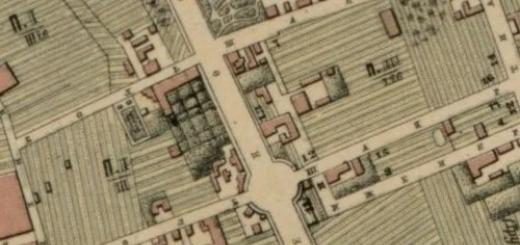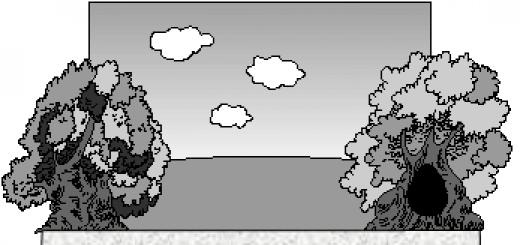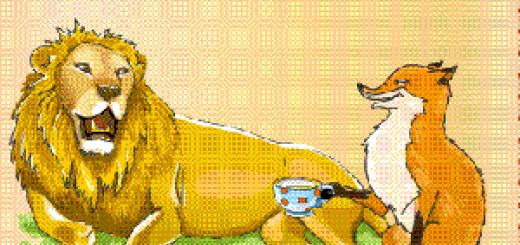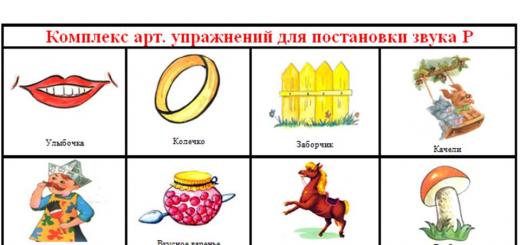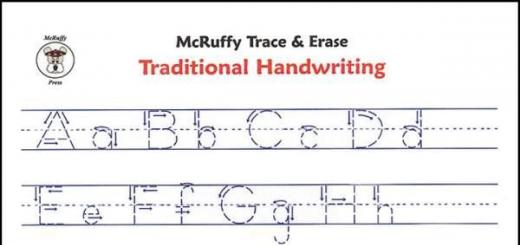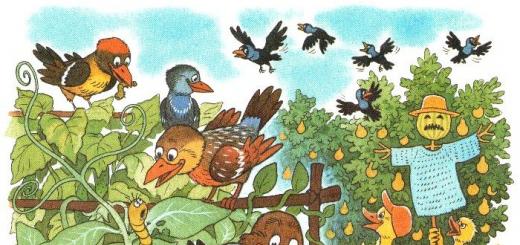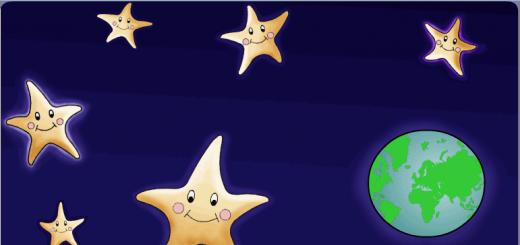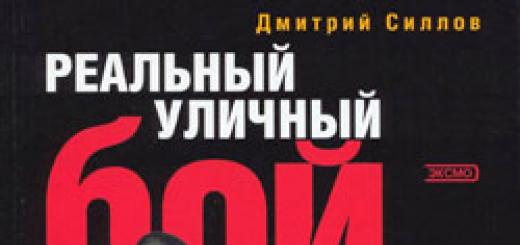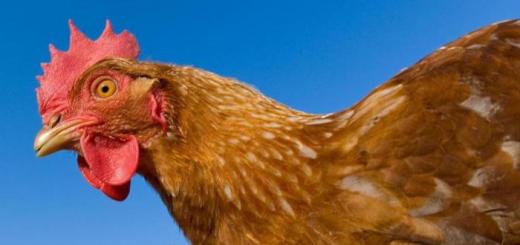Each personal pronoun in English language corresponds to a possessive pronoun.
Possessive pronouns reflect the belonging of an object to someone or something.
Those. answer the question whose? (whose?)
I(I) - my(my/mine/mine/mine)
I love my car - I love my cars at

Let's look at possessive pronouns in examples:

Note!
- There is no pronoun in English mine . When translating, it is replaced by one of the possessive pronouns. For example:
I love my car - I love my car
cat loves my toy - The cat loves its toy
- It is also worth remembering that the above possessive pronouns are always put front nouns
his car
my car
If it is necessary to add an adjective to a noun, then we put it after the pronoun
my beautiful car (my beautiful car)
- Possessive pronouns in English are often used even when they are absent in Russian (but are implied). For example:
He closed eyes- He closed his eyes
She visited parents- She visited her parents
- its / it's
its- is a pronoun
The cat loves its toy (The cat loves its toy.)
it’ s is an abbreviation for it is
It's a cat. = It is a cat. (It's a cat.)
Exercises
Exercise 1
To drag a word, click on it with the left mouse button, hold and drag to the desired space (spaces are indicated blue color). Release the left mouse button when the cursor is over where you want to place the word.
Exercise 2
Type the word in the white box below the picture. Click on the "Check" button or on the "enter" / "enter" button on your keyboard to check the correctness of your answer. Use the blue arrows below the picture to switch between cards.
Exercise #3
Now let's talk about cases when, after a possessive pronoun no noun.
Possessive pronouns without a noun
Sometimes we use pronouns without nouns. For example:
- Whose car is it? - My .
In this case, the form of the possessive pronoun in English is is changing.
It is my car. (This is my car.) mine. (She is mine.)
With a noun - my no noun - mine
Compare pronouns with and without a noun:

Let's look at how possessive pronouns change using examples:

Note!
1. Possessive pronoun its not used without a noun.
2. You may have noticed that this form of the pronoun is formed by adding a letter s to the end of a word (in all pronouns except my – mine ). And since in the word his she (letter s) already exists, this pronoun does not change.
It is his car. It is his .
3. Some more examples with possessive pronouns without a noun
Is this car yours or hers
?
Is this car yours or hers?
I don't have a mobile phone. could you give me Exercise 2
Type a word and press the "Tab" button on your keyboard, or left-click on the next empty box to easily move to the next question in the exercise.
We use possessive pronouns in our speech every day. This is my cat, their dog, her portion of ice cream, his briefcase, their daughter ... In almost every sentence we will see pronouns. Since the theory on this topic has already been studied, today we will proceed directly to practice in order to consolidate the knowledge gained. Remember: learning possessive pronouns in English exercises will help you remember the theory much more effectively than even a hundred repetitions. So straight to the point! We are waiting for interesting tasks that will be easy enough even for children.
Exercises on possessive pronouns are relatively easy. And if you first repeat the main subtleties of the translation, then the work on the assignments will be quite easy. So, to your attention are tables with possessive pronouns that will put all the features of the translation on the shelves.
First form of possessive pronouns
| My | My, my, my, my |
| His | His |
| Her | Her |
| Its | His her |
| Our | Ours, ours, ours, ours |
| Your | |
| Their | Them |
Second form of possessive pronouns
| Mine | My, my, my, my |
| His | His |
| Hers | Her |
| Ours | Ours, ours, ours, ours |
| Yours | Yours, yours, yours, yours; yours, yours, yours, yours |
| Theirs | Them |
As you already know, despite the fact that possessive pronouns (Possessive Pronouns) have two forms, they all answer the same question => whose? I.e Whose? Whose? Whose? Whose? At the same time, we want to remind you that the absolute form of possessive pronouns differs from the first (attributive) one both in spelling and in the role in the sentence: nouns do not follow the absolute form, they are missing.

Examples:
That is his cup => This is his cup (possessive pronoun in attributive form his+ noun cup)
But! That cup is mine=> This cup is mine (absolute possessive pronoun) mine, followed by no noun).
So, when we repeated the theory, we can safely proceed to the exercises. Now you can test your knowledge in practice. Forward!
Exercise 1. (possessive pronouns)
Correctly arrange the possessive pronouns, choosing from those proposed in the attributive form (my, his, her, its, our, your, their):
my his her ours
Book but she denied to return it to him.
I saw that picture in
his ours hers
House but don't remember whether it was her property or just a gift.
I forgot my glasses in
your my their hers
car. They will probably return it to me tomorrow.
The teacher was listening to
my theirs yours
Answer quite patiently but it was really silly one.
His Its Their Your Her
Jacket I found in
her his my ours
My Your His Our Theirs
Parents were absent while
his my their yours
Were at school.
Note! In these sentences, possessive pronouns can be interchanged. For example, in the last sentence, Possessive Pronouns can be interchanged without losing context. But, for example, in the third sentence there will be only one choice, since there is an identifier word they.
Continuing to use possessive pronouns
Exercise 2. (possessive pronouns)
Write the correct answer from those given in brackets:
My grandfather has a cat. color is warm red.
She saw dress washing in washing machine. The dress in the washing machine was (her, hers, its).
I saw him wearing best shirt. It suits him so much!
cat sleeps when it has done all insightful things.
They live in a big city. city is so nice I would like to visit it this summer!
I like dress more than .
I have a rabbit. The rabbit is .
plane is a luxury one as well as pleasure boat.
My sister has a doll. doll is very expensive.
Her brother is very naughty. Only trousers costs 5 times more than my most expensive dress!
Exercise 3. (possessive pronouns)
Put the correct pronouns in attributive and absolute form:
I have a dress. The dress is.
Dress is very nice.
Her friend has a new lipstick. The new lipstick is .
Lipstick is of dark wine colour.
This shirt is .
Shirt is from the newest collection.
The business is
their them theirs they
.They Theirs Them
Business is very successful. I had no doubt from the beginning!
This pizza is.
Pizza is with tomatoes and mozzarella while you decided to order a meat one. See we have different tastes.
Absolute possessive pronouns
Absolute possessive pronouns
In this section, we expand our knowledge of possessive pronouns by examining their variety, which is commonly called the absolute form of possessive pronouns. These are forms that are used by themselves, and there are no nouns after them.
My father is a doctor and yours is a policeman- My father is a doctor, and yours is a policeman
As you can see, in the second case, we no longer add the word "father", so we are forced to put not the usual possessive pronoun your, but the absolute yours.
Our car is very old and theirs is new Our car is very old and theirs is new.
This jacket is mine - This jacket is mine
The pronoun mine is used here because there is no noun after it.
Let's present a complete list of absolute possessive pronouns, correlating them with the main forms. Pay attention to each of them.
my - mine
your - yours
his - his
her - hers
its - its
our - ours
their - theirs
Such pronouns are translated into Russian in the same way as ordinary ones.
Examples:
My house is big. What about yours?- My house is big. What about yours?
His bicycle is broken down, take hers- His bike is broken, take it
That house by the river is ours- That house by the river is ours
Say it yourself in English:
My wallet is in the bag, where is yours?
His cell phone is more expensive than hers
These children are mine
Hover over each sentence to test yourself.
Often these forms are used in speech in order to avoid tautology and not repeat the same noun twice. Such as: My father is a doctor and your father is a policeman.
Sometimes phrases with ordinary and absolute possessive pronouns can be similar in meaning, but differ slightly in word order. Compare the following offers:
This is my wallet - This wallet is mine
This is my wallet - This wallet is mine
Is that your pen? - Is that pen yours?
Is that your pen? - Is that pen yours?
The absolute form of possessive pronouns is quite popular in English. You can often hear expressions such as "a friend of mine", which means "one of my friends".
I "m in a bar with a friend of mine- I'm at a bar with a friend
As you can see, when translated into Russian, both types of possessive pronouns do not differ in any way, since there is no such division in Russian. And the main difference between absolute possessive pronouns and simple ones is that there is no noun after them. If you understand the theory, start practicing and redo all the exercises on a new topic.
Exercises
Exercises
Exercise 1
Name in English both basic and absolute forms of the following pronouns
yours, ours, theirs, his, yours, mine, hers
Exercise 2
Rewrite the sentences according to the model
Example:
This is your house - This house is yours
1. This is my life - ...;
2. This is his watch - ...;
3. That's our money - ...;
4. This is her plan - ...;
5. These are their clothes - ... ;
6. Is this your land? - ... ;
7. These aren't her children - ....
Exercise 3
Fill in the gaps with the correct possessive pronouns, choosing between basic and absolute forms
1.
... (you) friends are very nice;
2. Is that ... (she) hotel?
3.
... (I) country is bigger than ... (you);
4. This car isn't ... (they);
5.
... (he) mother is a teacher and (she) is a judge;
6.
Where is ... (they) restaurant?
7.
How many people are there in ... (you) city? - About two million and in ... (you)?
8.
I "m going to visit a friend of ... (I) tomorrow;
9.
These are not ... (you) shoes. Those are ... (you).
Exercise 4
Translate the sentences into English
1.
Our car is bigger than yours;
2.
Where are his parents? And her?
3.
This bag is not mine;
4.
My horse is strong and yours is weak;
5.
Our vacation starts in September, and theirs?
6.
Is this your hat? - Yes, this hat is mine;
7.
Your grandparents are old and ours are young;
8.
My phone is broken, can I have yours?
9.
Now I am talking with one of my comrades;
10.
My hotel is on the beach, what about yours?
1. Find all types of pronouns in the following sentences. Translate the sentences.
- 1. Lara found her purse. It was in our garden.
- 2. I have some free time to talk to you about their party.
- 3. The twins asked me to teach them roller-skating.
- 4. My mum devoted herself to us, her children.
- 5. I myself baked these cupcakes.
- 6. Don't touch this ticket. It's mine.
- 7. We saw her in that shop but she didn't see us.
- 8. Does anybody love Chemistry in your class?
- 9. It's not his car. It's hers.
- 10. Nobody will read those books.
2. Put the appropriate reflexive pronouns (myself, yourself, yourselves, yourself, himself, herself, itself, themselves).
1. The dog enjoyed … with the children. (The dog had fun with the children.)
2. He cut … while shaving in the bathroom. (He cut himself while shaving in the bathroom.)
3. Did you hurt…? (Are you hurt?)
4. She introduced … as Alice Brown. (She introduced herself as Alice Brown.)
5. Kids, it wasn't your fault. Please don't blame … . (Kids, it wasn't your fault. Please don't blame yourself.)
6. Your face is dirty. Look at … in the mirror. (Your face is dirty. Look at yourself in the mirror.)
7. I don't like people who usually talk about .... (I don't like people who usually talk about themselves.)
8. I am the winner and I'm proud of ... . (I'm a winner and I'm proud of myself.)
3. Choose suitable personal and possessive pronouns. Translate.
1. Give ... (my, me, mine) a glass of water.
2. Who is sitting behind … (our, we, us)?
3. Would you like to dance with … (he, him, his)?
4. Joanna is going to meet ... (them, they, their).
5. It took ... (he, him, his) 5 days to get to ... (you, your).
6. Please help … (I, me, my) with … (me, my) homework.
7. This is … (me, my, I) cat. … (His, Her, Its) name is Tom.
8. She promised to help ... (us, our, we) and she will keep ... (she, her, he) word.
4. Choose the correct pronoun and translate the resulting sentences.
1. Did you enjoy … (myself, yourself, your) at the party? - well. Nick did. But … (I, my, me) didn't have a good time. I didn't know ... (someone, nobody, anyone) there. There were a lot of people and there was … (anywhere, nowhere, somewhere) to sit. Fortunately there was much food, so I helped ... (myself, myself, yourself).
2. … (What, Which, Who) of the two T-shirts do you like? - ... (I, Me, My) like both of ... (they, them, theirs). – And do you like … (this, these, that) jeans? – I think … (they, them, their) are awful.
3. I haven't got … (some, any, no) sweets for the kids today. Have you got … (some, any, no) sweets? – Don't worry. I've got ... (some, any, no).
4. This is ... (my, me, mine) garage. And the car is … (my, me, mine). That is … (our, ours, us) house. And the garden is … (our, ours, us).
5. … (This, These, That) two rings belong to … (him, his, he) grandmother.
Answers:
1. her - It - our (Lara found her wallet. He was in our garden.)
2. I - some - you - their (I have some free time to talk to you about their party.)
3. me - them (The twins asked me to teach them to roller skate.)
4. My - herself - us - her (My mother devoted herself to us, her children.)
5. I - myself - these (I baked these cupcakes myself.)
6. this - It - mine (Do not touch this ticket. It's mine.)
7. We - her - that - she - us (We saw her in that store, but she did not see us.)
8. anybody - your (Does anyone like chemistry in your class?)
9. It - his - hers (This is not his car. This is hers.)
10. Nobody - those (No one will read those books.)
1. itself
2. himself
3. yourself
4.self
5. yourselves
6. yourself
7. themselves
8. myself
1. me (Give me a glass of water.)
2. us (Who is sitting behind us?)
3. him (Would you like to dance with him?)
4. them (Joanna is going to meet them.)
5. him - you (It took him 5 days to get to you.)
6. me - my (Please help me with my homework.)
7. my - Its (This is my cat. His name is Tom.)
8. us - her (She promised to help us, and she will keep her word.)
1. yourself - I - anyone - nowhere - myself (Did you enjoy the party? - Well, Nick liked it. And I had a bad time. I didn’t know anyone there. There were a lot of people and there was nowhere to sit. Fortunately, there was a lot of food and I ate.)
2. Which - I - them - these - they (Which of the two T-shirts do you like? - I like both. - Do you like these jeans? - I think they are terrible.)
3. any - any - some (Today I don't have any candy for the kids. Do you have candy? - Don't worry. There are some.)
4. my - mine - our - ours (This is my garage. And my car. Our house is there. And our garden.)
5. These - his (These two rings belong to his grandmother.)
The section "Pronouns" is one of the most important sections of the grammar of any language and to begin pronouns in English needed already at the first level of study. In this article, I publish exercises for beginners on the most important groups of pronouns. References are given to theoretical material on the topic "Pronouns in English". Pronoun Exercises for Beginners arranged in order of increasing complexity and contain only the most commonly used vocabulary.
Pronouns. Exercises for beginners (level 1- beginner)
1. Personal pronouns. Exercises for beginners
Exercise 1. Fill the table. Choose from the list of words that can be replaced by “he”, “she”, “it”, “they”.
Children, a cat, animals, Mary, parents, Oleg, friends, a pen, books, a family, rain, a house, mice, February, summer, a river, Peter and Mike. a dog, windows, Tuesday
| he | she | it | they |
Exercise 2.Replace the underlined words with personal pronouns.
1. Nick is from Great Britain. 2. Iren is a student. 3. Bert and his brother live in London. 4. Helen and me are good friends. 5. Are you and your sister twins? 6. Thecat is drinking milk.
2. Demonstrative pronouns: this, these, that, those
Exercise 3 Build sentences according to the model. Use the imperative mood of the verb look and demonstrative pronouns this- this (this) and these-these.
Imperative verb stands in the first form (from the dictionary).
look - look
Look at ... - Look at ...
- man / fat - Look at this man. He is fat. - Look at this man. He is fat.
- hat / new - Look at these hats. They are new. - Look at these hats. They are new.
1.woman/thin
2. sportsman / tall
3.sportswoman/short
4. children / noisy
5 feet / clean
6. hands / dirty
7. dogs / spotty
8. cats/ old
Exercise 4 Choose English equivalents for pronouns this, these, that, those.
1. What color are (those) pens?
2. (That) boy is my friend.
3. I want to read (that) book.
4. (Those) children are my friends.
5. What is (this)?
6. (This) table is round.
7. (These) cats are white.
8. (Those) flowers are roses.
Exercise 5 Change the sentences into plural.
SAMPLE. This is a spider. – These are spiders.
1. This is a spider. 2. That is a snail. 3. This is a star. 4. This is a boy. 5. This is a baby. 6. That is a flower. 7. That is a shelf. 8. Is this a sofa? 9. Is this a bookcase? 10. Is this a man? 11. Is that a woman? 12. Is that a train? 13. Is that a plane? 14. Is the window open? 15. Is the door closed? 16. That is not a king. 17. That is not a queen. 18. That is not a bus. 19. This isn't a mountain. 20. This isn't a mouse.
Exercise 6 Translate sentences with turnover "This…» into English.
- This is a child. — This is a child.
- These are kids. – These are children.
1. This is a hat.
2. This is a car.
3. These are toys.
4. This is a pen.
5. These are pencils.
3. Personal and possessive pronouns
Exercise 7Fill in the gaps with pronounsmy, your, his, her, our, their.
REMEMBER: I would like = I'd like- I would like to
- I'd like some ice in ……orange juice.
- We'd like to have breakfast in….room.
- The children would like to watch TV in …. room.
- He'd like some milk in ….. cereal.
- She'd like lemon in…..tea.
Exercise 8Insert the missing pronouns in place of dots.
1.What's…. name? — Jim Sanders. 2. What's ... name? — Jane Smith. 3. What are … names? — Jack and Tom. 4. What's ... name? — My name is Mary. 5. What is the dog's name? —…..name is Black. 6. What are your names? —……names are Dick and John.
Exercise 9 Fill in the gaps with possessive pronouns.
- This is Mrs Simpson. And this is……daughter.
- This is Mr White. And this is … wife.
- My name is Ann. And these are….. parents.
- These are Tom and Jack. And these are….. sisters.
- This is my dog. And this is…. bone.
- These are cats. And these are … kittens.
- This is Mary And this is…. doll.
- We are sisters. This is….. mother.
Exercise 10Make changes to the sentences using the pronouns given in brackets.
- I have a dog in my house. (she)
- I wash my hands and face in the morning. (he)
- I go to the cinema with my friends. (they)
- I play football with my brother. (he)
- I do my homework in the evening. (we)
- I help my mother. (they)
- I clean my room every weekend. (you)
- I drink my milk in the morning. (the cat)
- I often write letters to my granny. (you)
- I have my breakfast at seven thirty. (she)
Exercise 11 Translate into English only the pronouns.
There is no pronoun in English "mine". Instead, you need to use the appropriate possessive pronoun (mine, ours, yours, his, her, theirs).
1.My pencil on yours table.
2. He gave father mine the address.
3. Her sister lives in Moscow.
4. I found his clock.
5. She saw them House.
6. His dog eats out his bowls.
7. She gave me mine phone number.
8. You saw our House ?
Exercise 12 Translate the possessive pronoun "your".
1. I gave him ... (my) pencil.
2. Marina gave me … (his) textbook.
3. The students put ... (their) books on the desks.
4. Nick wrote down … (his) address for her.
5. Show me ... (your) house.
6. We drank ... (your) tea.
7. The dog ate ... (his) bone.
Exercise 13Insert the correct possessive pronoun.
1. What is (his) father?
2. Where are (her) parents?
3. They are busy with (their) lessons.
4. This is (their) flat.
5. What color are the walls in that room? (Her) walls are grey.
6. (My) parents are at work.
7. (Our) flat has five rooms.
8. (His) work is very interesting.
9. (Her) pencil is on the table.
10. This is (our) dog.
Sometimes the noun AFTER the pronoun is not put in order to avoid repetition. In this case, an independent form of the possessive pronoun is used.
EXAMPLE. This cat is hers.- This dog her.
Exercise 14Translate from English.
- I have a house. This is my house. This house is mine.
- We have a dog. This is our dog. This dog is ours.
- They have a cat. This is their cat. This cat is theirs.
- You have a bike. This is your bike. This bike is yours.
- She has a sister. This is her sister. This sister is hers.
- He has a brother. This is his brother. This brother is his.
Exercise 15 Insert the correct form of the pronoun.
- I have got a bike. This is……bike.
- Have you got a car? Is this car…?
- We have got a cat. This is …… cat.
- They have got a dog. This dog is…
- She has got many hats. These hats are…
- He has got many caps. These are… caps.
Exercise 16Translate into English using turnover and pronouns: personal and possessive (simple and independent forms).
- I have a pen. This is my pen. This is my pen.
- They have an apartment. This is their apartment. This apartment is theirs.
- Do you have a cat. This is your cat. This cat is yours.
- He has friends. These are his friends. These are his friends.
- You have a home. This is your home. This house is yours.
- She has a car. This is her car. This car is hers.
- We have a cat. This is our cat. This cat is ours.
- The dog has a bone. This is her bone. This bone is hers. (a bone)
* * *
4. Personal pronouns and pronouns - additions
Exercise 17 Complete the sentences with personal pronouns and object pronouns.
SAMPLE. I want to see them but they don't want to see me.
1. He wants to see her but _______doesn't want to see _______.
2. You want to see him but _______doesn't want to see_______.
3. They want to see you but_______ don't want to see_______.
4. She wants to see us but ________don't want to see _______.
5. We want to see them but _______ don't want to see _______.
Exercise 18 Replace nouns in sentences with object pronouns.
SAMPLE. Please pass the sweets to Sandy. — Please, pass them to Sandy.
1. The teacher reads the story to the children.
2. Did you give the letter to your friend?
3. Alice sends a card to granny.
4. Can you give the book to my brother?
5. We gave some food to the cats.
6. Will you tell this to my parents?
7 Phone me and my brother tomorrow.
8. I don't like to talk to Nick.
9. Would you like to join Mary and me?
10. Tell Ann about it.
Exercise 19 Translate the sentences. Insert pronouns-complements according to the meaning.
1. I don't know these men. Do you know...?
2. Where is Tom? I want to speak to …?
3. We live in Russia. Our parents live with…
4. I bought some bread. Will you take … out of the bag?
5. The children are in the yard. Can you see…..?
5. Interrogative pronouns
Exercise 20 Insert interrogative words (interrogative pronouns).
- (What) do you like to do?
- (How many) friends have you got?
- (How) are your parents?
- (Why) are you so late?
- (Where) do you live?
- (When) is your birthday?
- (Who) knows your telephone number?
Exercise 21 Insert interrogative words (interrogative pronouns) according to the meaning. In some cases, 2 options are possible.
1. … are you?
2. …is your name?
3. …do you live?
4. … color is this flower?
5. … big is your family?
6. … do you learn English?
7. … do you have free time?
Exercise 22. Learn the dialogues.
Dialogue 1.
— She has gone to the country. She has gone out of town.
— What for?- Why?
— To visit her parents. - Visit your parents.Dialogue 2.
— He has gone on a trip to the South. He went on a trip to the south.
— What for?- Why?
— To take pictures of the sea. - Photograph the sea.Dialogue 3.
Mother has gone shopping. - Mom went to the store.
— What for?- Why?
— To buy some bread and milk. – Buy bread and milk.Dialogue 4.
Mother said she needed you at home. Mom said she needs you at home.
— What for?- Why?
— To look after the children. - Look after the children.


